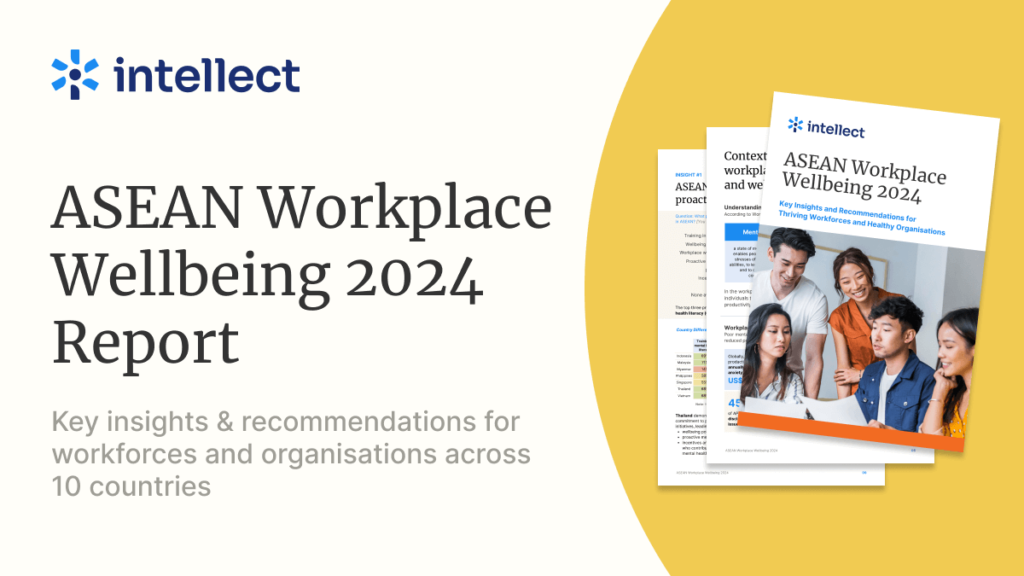“Just because no one else can heal you or do your inner work for you, does not mean you can, should or need to do it alone.” – Lisa Olivera
Many believe there is no point in sharing our mental health challenges with others at home and work because there’s only so much family and colleagues can do. Even though destigmatisation has been well-paced in recent years, workplaces have a long way to go in normalising such conversations.
As a life coach, and HR professional, I have seen executives who choose paid sessions with me over practitioners within their organisations who are available free of charge. Held back by the fear of jeopardising increments, promotions, reputation, and even job security in the event of downsizing, 82% of workers diagnosed with mental illnesses do not disclose them to their managers.
However, when mental disturbances go unaddressed, employees who work at a slower pace end up working longer hours and sleeping less. Which begs the question: at what cost should employees withhold their state of mental health?
Should you talk to your manager about your mental health?
Created by the French mathematician and philosopher Descartes, the Cartesian Quadrants is a technique I use with clients who have to make tough decisions independently.
This method elicits genuine responses and considers the implications of every possible decision from four angles. It tackles a pattern of self-sabotage by honing in on one simple question: what happens if I do this? As our minds get confused when holding too many viewpoints, writing is imperative in this exercise. You can try this alone, with a friend, or with a coach.
Below is an exercise on deciding between disclosing and withholding feelings of burnout, depression, and anxiety at work.
It is critical to acknowledge that a negative perception could be made in all cases. Despite that, should an employee conclude that it’s more logical to disclose than withhold, it is important to identify the best person in the organisation—whether it be the HR manager or their immediate supervisor—to handle this maturely. Depending on the employee’s comfort level, they can decide to have this conversation in a formal office setting or over a cup of coffee informally.
Set your intentions for the conversation
Set basic expectations before initiating a conversation. What do you hope to achieve from the sharing? Here are some possibilities:
- A better rapport and more trusting working relationship
- More flexibility and ease when taking days off
- Reduced workload
- Change of role, team, or function
- Additional support on time-consuming tasks
More importantly, what are the trade-offs you are willing to make for your desired outcome? Would you be okay to work fewer hours if it meant a temporary pay reduction? Help your manager or HR personnel help you by considering these outcomes ahead of time.
Decide how much “downtime” you need
In some cases, stress can be eased in a week or two. In others, employees who are burnt out may need to take a few months off work, and those with diagnosed mental health conditions may need long-term treatments. To avoid assumptions by the management and manage their expectations, communicate what you need clearly so they know how to follow up.
Create an entry point in the conversation
For employees who are nervous about broaching the topic of mental health with their supervisors, it might be a good idea to start with the company’s values or recent movements. This could sound like:
“Last month, the leadership team discussed the importance of transparency in our town hall. I have given some thought and, in the spirit of openness, would like to share some challenges I’ve been facing at work.”
“As you are a mentor to me, I would like to seek your advice on managing the ever-changing work arrangements lately. Frankly, I’m finding it difficult to adjust.”
When asked for advice, people are often willing to share and curious to know why they were chosen as confidantes. This gives employees an entry point to open up, though they should be mindful of boundaries in informal exchanges.
Explain the impact on your work
Opening up is cathartic and it can be tempting to go off on a tangent, but employees must remember to highlight how mental health struggles ultimately affect their performance at work. Are their struggles inhibiting them from engaging with team members? Or are they translating to lower productivity and quality of work?
Follow that up by asking about potential provisions and, based on deliberation in the first two steps, state your preferred outcome from the conversation.
Give your manager time to process
While the situation may feel urgent, employees should understand that their managers may not have dealt with such a conversation before. Even if their reaction is not ideal, respect their need for time and space to process your sharing before committing to an action plan. Be patient and check if there’s a better time to follow up with them.
How employers might respond
Contrary to the disastrous consequences employees imagine, employers will not resort to immediate and harsh action in most cases. Instead, they would look for alternatives.
A client I coached was offered a different role that no longer required them to face customers. It sounded like a compromise initially, but its benefits on the employee’s stress levels were remarkable. Temporary and permanent role switches may also be offered to help employees cope with mental health challenges without compromising their jobs. Some firms have introduced sabbatical leave policies for employees with diagnosed mental illnesses, while others refer them to internal counsellors. The appropriateness of a solution-focused approach depends on the company’s inclination, to begin with.
At an organizational level, managers and HR personnel should also be trained to handle mental health conversations sensitively by listening actively without judgement. At the end of the day, only with a mutual effort from employers and employees can this endeavour succeed.
Contact us
Benjamin Brustis – Head of Business Development, Hong Kong
Email: benjamin.brustis@intellect.co
Phone number: +852 6909 9820
Intellect team: team@intellect.co or visit https://go.intellect.co/hk/ to learn more
難題:如何與經理談論我的心理健康?
「僅僅因為沒有其他人可以治愈您,或為您調整內心世界,並不意味著您可以、應該或需要獨自去做這件事。」– 麗莎·奧利維拉(Lisa Olivera)
很多人認為,在家裡和工作中與他人分享心理健康問題沒有任何意義,因為家人和同事能做的有限。儘管近年來去污名進展順利,但在使此類對話正常化方面,職場還有很大的改善空間。
作為一名人生導師兼人力資源專業人士,我曾經見過一些管理層選擇我的付費服務,而不是其機構內的免費專業服務。由於擔心會危及加薪、晉升、聲譽,甚至在裁員時擔心工作的安全,被診斷患有精神疾病的僱員中有 82% 僱員不願向其經理披露病情。 然而,如果精神障礙無法解決,工作速度較慢的僱員最終會有導致更長的工作時間更長的工作時間和更少的睡眠。這就帶出了一個問題:僱員應為隱瞞心理健康狀態付出多少代價?
您應該與經理談論心理健康嗎?
由法國數學家兼哲學家笛卡兒創建的笛卡爾積,是我與必須獨立作出艱難決定的委託人一起使用的技巧。
這種方法會引起真誠的反應,並從四個角度考慮每個可行決定所帶來的影響。它透過聚焦一個簡單的問題來解決自我破壞的模式:如果我這樣做會發生甚麽事?當我們持有太多觀點時,我們的思維就會變得混亂,因此在這個練習中寫作是必不可少的。您可以單獨嘗試,與朋友或導師一起嘗試。
以下是關於決定在工作中披露或隱瞞職業過勞、抑鬱和焦慮情緒的練習。
我們必須承認,所有情況下都可能產生負面看法。儘管如此,如果僱員認為披露比隱瞞更合乎邏輯,則一定要識別機構中的最佳人選(人力資源經理或其直屬主管),以成熟的方式處理問題。根據僱員的自在程度,他們可以決定在正式的辦公室環境中,或非正式的休閒情況下進行此對話。
設定對話的意圖
在開始對話前設定基本期望。您希望從分享中實現甚麽目標?以下是一些可能性:
- 更融洽、更可信的工作關係
- 休假時更具彈性、更輕鬆
- 減少工作量
- 職責、團隊或部門的變化
- 對耗時的任務提供額外支援
確定您需要多少「休息時間」
在某些情況下,壓力可以在一兩星期內緩解。在其他情況下,出現職業過勞的僱員可能需要休息幾個月,而被診斷出患有精神健康問題的僱員可能需要長期治療。為了避免管理層的假設並管理他們的期望,請清楚告訴他們您的需要,以便他們知道如何跟進。
在對話中創建切入點
對於不願與其主管討論心理健康話題的僱員來說,最好從公司的價值觀或最新動態開始談起。這聽起來像:
「上個月,領導團隊討論了市政廳中透明度的重要性。我做了些思考,並本著開放的精神,想分享我在工作中面臨的一些挑戰。」
「由於您是我的導師,我希望就管理最近不斷變化的工作安排尋求您的意見。坦白說,我發現很難適應。」
當被要求提出建議時,人們通常願意分享,並且很想知道為何選他們為知己。這為僱員提供一個敞開心扉的切入點,不過他們應該注意非正式交流中的界限。
說明對工作的影響
敞開心扉是一種宣洩,可能很容易偏離正題,但僱員必須謹記強調心理健康問題最終如何影響其工作表現。他們的問題是否阻礙他們與團隊成員之間的互動?或是否轉化為較低的生產率和工作質素?
接著詢問潛在的規定,並根據前兩步的思考,陳述您希望從談話中得到的結果。
為您的經理提供處理時間
雖然情況可能很緊急,但僱員應該明白其經理以前可能沒有處理過此類對話。即使他們的反應不理想,也要在實施行動計劃前,尊重他們需要時間和空間來處理您的分享。要有耐心,看看是否有更好的跟進時機。
僱主可能如何回應
與僱員想像的災難性後果相反,在大多數情況下,僱主不會立即採取嚴厲的行動。他們反而會尋求替代方案。 我指導的一位委託人獲調換到無須面對客戶的其他職位。起初,這聽起來像是一種妥協,但它對緩解僱員壓力水平有顯著益處。機構還可以調換臨時和永久的職位,幫助僱員在不影響工作的情況下應對心理健康問題。一些公司為被診斷患有精神疾病的僱員引入了公休假政策,而其他公司則將其轉介給內部輔導員。首先,以解決方案為中心的方法是否合適取決於公司的意向。在機構層面,經理或人力資源專員也應該接受培訓,透過非批判的積極傾聽來敏感地處理心理健康相關的對話。最終,只有僱主和僱員共同努力,這項嘗試才能取得成功。
聯絡我哋:
Benjamin Brustis - 香港區業務發展部主任
電郵:benjamin.brustis@intellect.co
電話:+852-6909-9820
或者點擊 https://go.intellect.co/hk/ 理解更多





